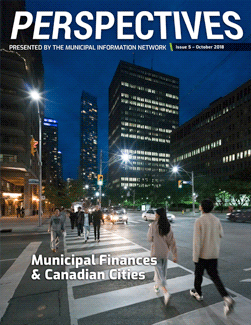When countries go to war they target each other's major cities. Damage a country's city and you weaken the nation. It is strange that many governments don't respect the equation in reverse. If attacking cities weaken a nation, does it not make sense that building strong cities is key to building a better country?
While cities may be the creatures of the provinces, it doesn't follow that they need to be impoverished ones. Nor does it make municipalities the exclusive domain of provincial capitals. Canada's urban areas succeed precisely because they have both federal and provincial investments. Housing, transit, waterworks, green infrastructure, hospitals, universities, and immigrant resettlement services, to name a few, are all areas of national importance that impact cities directly. That is why Ottawa partners with cities on so many of these issues.
The gas tax is an area where the Government of Canada has decided to play a direct role in the financial health of Canadian municipalities. Federal funds flow to municipalities across the country for two very good reasons. Firstly, the federal government has a responsibility to all Canadians. Secondly, when Canada's cities thrive the country does better. It is in the national interest to make sure our country's urban areas are doing well.
By and large, our large metropolitan areas are in fact doing well. International rankings across a range of measures show Canadian cities at the top in almost all categories. Doing well is nice, but doing better must be the goal.
Canadian municipalities own, manage, and build over 60% of this country's infrastructure, but they do it with less than 10% of the tax base. In the modern world, quality of life, economic and population growth, and cultural realities all indicate that urbanism is becoming more and more intense. As cities grow, their capacity to shoulder that growth must grow with them.
Climate Change is also a factor, whether it is forest fires driven by drought, floods from massive storms, or smog from excessive pollution, extreme weather is impacting cities to a greater extent year after year. Damage from these events, mass population migrations, the loss of key infrastructure, or just the frequent delay and loss of social capacity are all disproportionally affecting urban areas.
Our government realizes these risks to cities`, but we also understand the opportunity what building more resilient cities offers Canadians. Stronger cities protect our population and give us economic security. As living laboratories, our country's cities are also charting the way for urban areas in other countries to adapt. Getting it right in Canada creates the possibility that our technology and strategies will become exportable.
To take the next step, Canadian cities need new revenue. Some of it can be done through new programs, but the best way to support our municipalities is new' revenue streams. The new funding must be aimed at building stronger economic foundations for our cities. Local councils with their mayors know best how to build and operate needed infrastructure, but building hard services is not enough. Revenues are also needed to animate services that flow from new infrastructure. For example: buses need drivers, fares must be affordable, and new service routes must be planned and executed. New transit vehicles by themselves don't extend service.
It is just as important to note that rural, remote and northern towns often lack the funds to even apply for federal infrastructure programs. For these communities to grow and contribute to Canada's economy we need to invest in their operations in a sustainable way. This funding needs to be robust and predictable to support long term planning.
The new revenue stream should not be a new tax. The Federation of Canadian Municipalities has called for a revenue stream that grows with the economy as a hedge against inflation. They have suggested redirecting taxes already collected as the preferred way forward. This is good advice. The City of Toronto has historically called for one cent of every dollar collected by GST. Again, good advice.
Our Government values the important contributions and leadership that our country's municipalities play in the quality of life for all Canadians. We look forward to working with the sector to strengthen its capacity. In short, municipalities matter and our government values their partnership.
Adam Vaughan, M.P.
Spadina-Fort York








